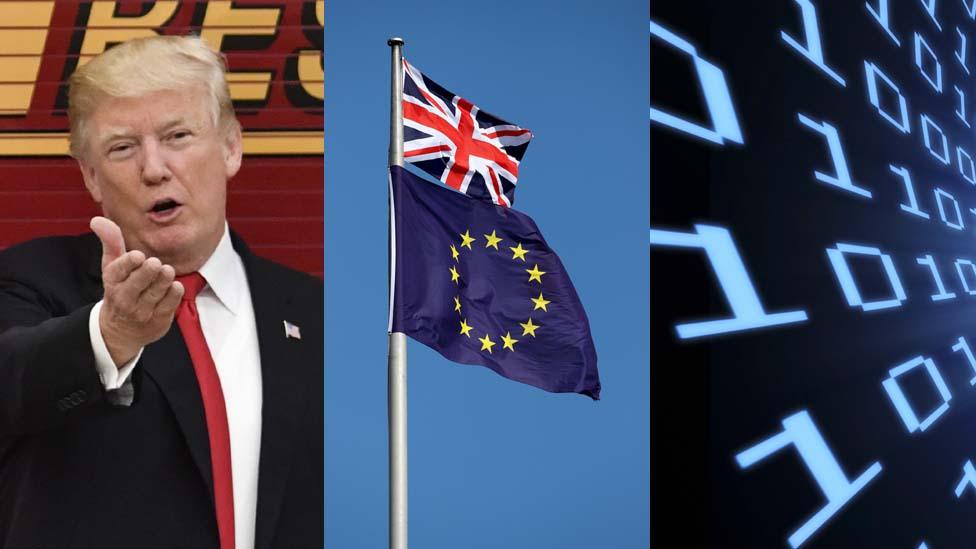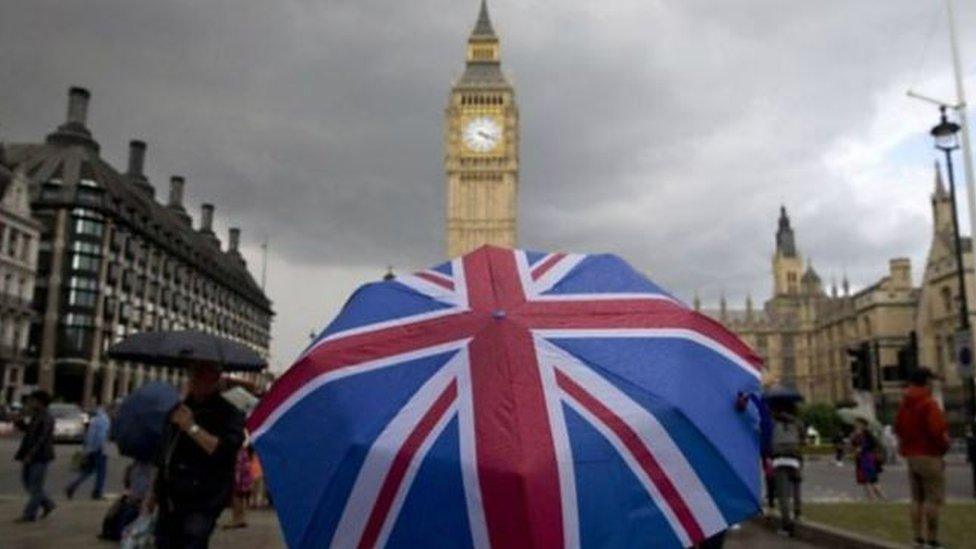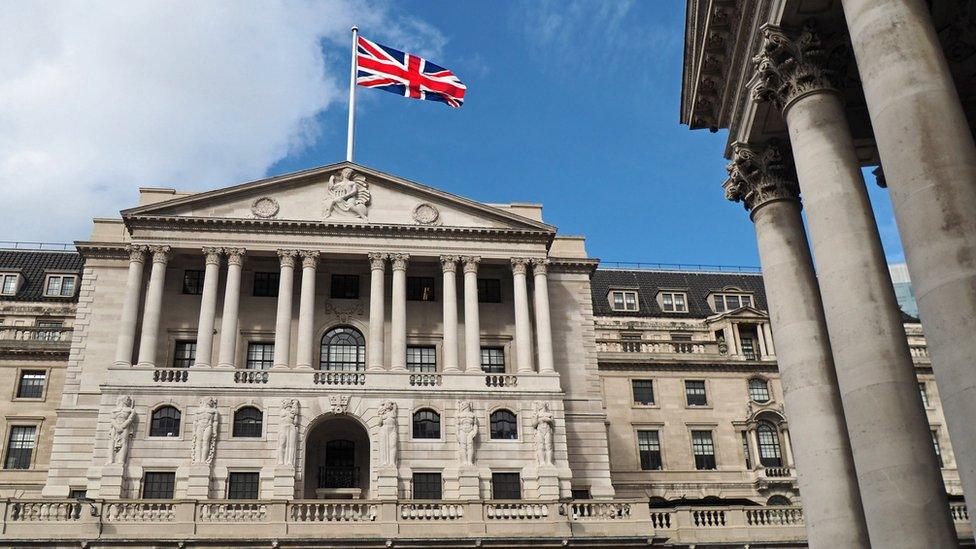New year, same fear?
- Published

Trump, tech, Brexit - three dominant themes from 2017 which seem likely to stay the course through 2018.
So long as Mr President craves attention, he can get it by being unpredictable, divisive, offensive and wildly unorthodox. So predicting anything in the Trump era is of limited value.
It's a bit easier to see the direction of travel for information technology. The power and reach of digital and social media can only grow, and grow society's dependence on some very large corporations.
The battle to control them is already established as one of the big issues of our times, and as people wake up to the significance of that corporate power, it will become a lot bigger.
Extrapolating from the past year or so, the pathways worth following into the new year include artificial intelligence. Its incursions into the home, transport, commerce and the workplace will see our judgements increasingly pre-empted and replaced.
As it does so, the combined power of capitalism and technology to keep generating attractive jobs will be one of the biggest challenges, and that will reach far beyond the low skilled. Accountancy, for instance, is set for a huge shift into the digital audit and tax return.
Things
The Internet of Things is becoming a reality. Smart phones and tablets are connecting with voice-activation. The smart TV reaches into our leisure hours and lets us control viewing schedules.

Smart meters for energy should be coming to your home this decade, but the roll-out has been a bumpy one. Maybe this year...?
What this requires is infrastructure, and lots of it, in fixed line broadband and mobile signals. Mobile data use was up 47% in the UK last year. It's rising fastest where the connection speeds are fastest.
And while mobile tech is increasingly the connection of choice, it's nowhere good enough to compete with fixed lines for heavy digital lifting. In 2017, mobile accounted for only 4% of the vast amounts of data traffic.
Improving telecom linkage has become a source of tension between Westminster and Holyrood. The Scottish problem may be partly governmental, but seems to be mostly geographical.
Links
An Ofcom report in December demonstrated that. If you measure mobile phone coverage by the number of workplaces or homes, 97% are covered in the UK, and 94% in Scotland.
The signal fails to reach indoors for some of them, but the gap is similar.

However, measure it by geographical spread during 2017, and you'd have found 88% of England had a mobile phone signal. That's true of only 40% of Scotland.
If you want to access data, such as a website to find a transport connection timetable, you'll find a signal in 82% of England, but only 31% of Scotland.
Closing that gap is going to be important to the Scottish economy, and particularly to the tourism sector, which has its strengths where population is sparse, and behind big mountains.
Regrets
What then of Brexit in 2018? It is hugely divisive, but almost everyone looking into the economic future is agreed that it will determine the future course of the UK economy.
Economists mostly take Rick's view, from the foggy runway in Casablanca: "One day you're going to regret it, maybe not today, maybe not tomorrow, but soon, and for the rest of your life."

The economy and society could adjust to the shock, they say (they may have to) but don't expect the adjustment to be instant or pain-free.
A few economists, along with politicians pledged to the political project of extracting the UK from the European Union, see beyond the warnings to the opportunities from forging new trading relationships, with Europe and beyond.
Lobbies
What business says is of interest here. If the economy and prosperity matter, perhaps it ought to be of paramount interest.
The voices you'll hear most are those of business lobby groups, pressing their cases for negotiators to prioritise them.
Motor manufacturers, speaking loudly and with a lot of jobs, have a strong case to protect their complex supply chains, in both directions across the North Sea and Channel.

The financial sector is among the first to shift jobs - not lock, stock and barrel, but some - to operate key functions from financial centres within the European Union. For them, the delays have already taken too long. They have to get the necessary licence arrangements in place, and that means starting work this winter.
The farming and food sector faces many of the highest barriers from tariffs if the UK doesn't get a favourable deal. That could protect British farmers, and make farming much more profitable.
But will there be access to the seasonal foreign workers to harvest British crops and run British abattoirs? And what guarantees of the subsidy regime that replaces the Common Agriculture Policy?
Upbeat
While the economists tend to be gloomy about prospects, businesses taking part in surveys have a different perspective. They may fear a slowdown in the economy, and a squeeze in demand, meaning they are slow to invest.
But asked about their own businesses prospects, they will often say: 'if it happens, we'll just have to live with it, so why not make it work for us? What alternatives have we got?'
That reaction seemed to drive the findings of the most recent Royal Bank of Scotland quarterly monitor, published just before Christmas, and from Scottish Engineering's quarterly returns.
Exports 'lift outlook' for Scottish firms
Taken in aggregate, lots of businesses being positive about the next six months was forecast to drive the fastest growth rate for years.
The dissonance may have to do with the survey method. Many of these business surveys bluntly ask busy managers if things are up, down or much the same: revenue, order books, recruitment, exports, outlook, and so on.
Reducing the positive/negative balance to a headline, the many who are staying the same get ignored. And while there could be lots who are positive, but only a small bit, they can outweigh the few who are negative, but really really pessimistic. Or vice versa. And from these survey results, you would rarely know it.
Agents
So it's worth a look at some more qualitative findings about the way business sees Brexit. That would include the quarterly report of the agents of the Bank of England. That makes them sound like a spying network, and in a way, that's what they are.

With one of them, William Dowson, based in Scotland, the dozen agencies gather intelligence from numerous contacts across business, the public sector and the wider economy, which is fed back to the central bank.
There, it is used to inform decisions on interest rates and financial controls on bank lending.
And what did they have to say in their most recent report?
They say that recruitment concerns have risen high on the list of business concerns, partly through the coming restrictions on immigration, and the lower value of UK pay when exchanged into migrants' home country currency.
That search for the right workers with the right skill set is seen as beginning to put pressure on pay - up by a modest amount, while non-pay benefits are being seen as a more important way of retaining skills. Avoiding the expense of recruitment and training is well worth the effort, so managers will need to hone a different set of people managing skills.
Asked if Brexit could affect pay, a narrow majority of business contacts expected no material effect. The others were split between uppers and downers.
Modest
Investment intentions remain "modest", and "consistent with moderate growth". Britain's poor productivity needs to do better than that. But on this evidence, the firms talking to Bank of England agents think they've made more progress in boosting productivity than the official data suggests.
Car sales have plummeted in recent months, and manufacturers have already "significantly reduced" their expectations of 2018. This weakness of the sector that requires healthy consumer confidence for the big ticket sale was one of the factors linked to the squeeze on real earnings, as price inflation continues to outstrip pay growth.
"Professional services firms across law, accountancy and consultancy reported robust demand for advice related to acquisition of UK assets" - that is, British assets are going cheap. But those firms offering professional and administrative services were also found to be in the sector most likely to see Brexit hit their sales by 2020.
They were also telling the agents that they've got robust demand from "the establishment of UK operations by EU clients to retain market access."
This latter factor is little noted. While British business prepares to establish itself in the continental EU27, the reverse is also true. EU businesses think the loss of a seamless single market means they'll have to increase their UK presence. There could be some valuable business to be won by becoming the go-to location.
In oil and gas, overseas activity has "edged up from a low base". And in the supply chain for this predominantly Scottish sector, suppliers "continued to report moderately improved demand, but many had also diversified to seek growth".
That chimes with other evidence from the sector. The post-2014 slump seems to have bottomed out, though there are concerns about the high numbers who don't think they'll have to diversify away from hydrocarbons.
Exports
Export activity was robust, helped by sterling's weakening in the past two years. But here's an interesting observation: those Bank of England agents found a tendency to take that advantage in higher profits from existing sales levels, rather than cutting prices to grow sales and market share.
While there's not much appetite for using those higher profits to grow investment, that looks like a depressingly short-term outlook from British managers.
And, the Bank's report goes on, "There were fewer examples of domestically focused businesses considering exports for the first time than might have been expected, given the fall in sterling."
"In addition, some EU clients had started to switch from UK to EU suppliers where contract expert dates spanned 2019 and beyond."
Ponder on that a while. That's your actual Brexit effect, right there.
And it continues, though we're back to survey statistics. Asked between August and October, the average probability of Brexit reducing sales was 45%, and an 18% chance of it improving them. You'll note that nearly 37% don't foresee any impact, though that was falling during 2017, while there's growth in the 'big negative' category.
Infectious
That might give some guidance to how British business begins 2018; divided on the impact of Brexit or, for some, apparently unconcerned: slow to pick up on the long-term opportunities of weakened sterling: and cautious while they wait to see how Brexit falls.
Too much caution, though, can be infectious. Repeated across businesses, it can stifle both growth and innovation. As President Franklin Roosevelt almost said: "We have nothing to be cautious about except caution itself".
- Published14 December 2017

- Published14 December 2017
